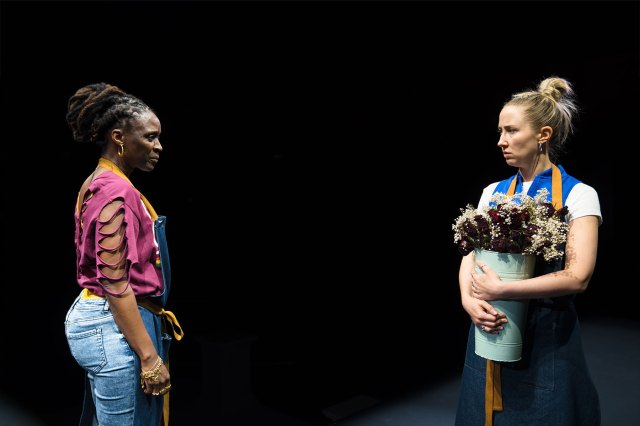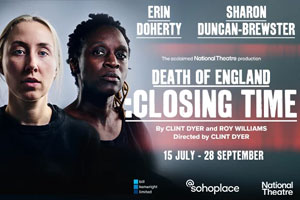Death of England: Closing Time in the West End – review
Roy Williams and Clint Dyer’s play is being staged in rep with Death of England: Michael and Death of England: Delroy at London’s @sohoplace until 28 September

When this concluding tranche of Clint Dyer and Roy Williams’s punchy, vital trilogy of state-of-the-nation Death Of England plays premiered at the National last autumn, this country was still under a culture wars-stoking Tory government. Fast forward ten months and, while only a fool would describe the UK as healed and trouble-free, this entertaining but not fully cogent two-hander already seems dated, especially compared to Michael and Delroy, the riveting solo plays that precede it.
Where those impassioned monologues felt urgent and character-driven, as they dealt with difficult but essential topics such as ingrained racism and social disenfranchisement, Closing Time puts issues rather than people to the fore, ultimately with detrimental dramatic impact. It’s still mightily watchable, but where Michael and Delroy spoke to each other as scripts (the eponymous best friends share common ground and chosen family, but their differences in skin colour contribute to markedly contrasting life experiences), this one feels more contrived, as though authors Dyer and Williams were obligated, rather than truly compelled, to create a couple of balancing female voices.
Black, regal Denise (Sharon Duncan-Brewster, reprising her National Theatre role), is Delroy’s Mum, and motormouth Carly (Erin Doherty), mother of Delroy’s child but also sister of Michael and possibly tainted by the same unthinking racism espoused by their now-deceased father, are in the process of closing up a business they were running together. Aside from the improbability that Carly’s mother would’ve sold her house to fund this shop which Denise also sunk her life savings into, the concept of a family-run concern being bought out by a commercial juggernaut such as Gail’s Bakery as gentrification marches unchecked across the urban landscape, hardly feels original.
I didn’t see last year’s production but I wonder if compressing the play from its original two-act, two and a half hours length to an interval-free 100 minutes, presumably to make it more of a piece with its predecessors and to render three show days more manageable, might have blunted the text’s force. Where Michael and Delroy get a whole play each to themselves, Carly and Denise receive the same amount of stage time between them, inevitably robbing the women of a certain amount of nuance and detail. The result is a script that is frequently hilarious, ultimately moving but doesn’t really provide any insights that weren’t already covered in the earlier plays.
Certainly, Dyer’s staging, played out on an identical St George’s Cross set by Sadeysa Greenaway-Bailey and ULTZ, with the same impressively high-precision, bombastic bells-and-whistles lighting, sound and music, has a similar command of energy, stillness and focus as the first two pieces of this rich theatrical pie. The tone here is more hectoring and relentless, however, as the two women bawl and shout each other down. When moments of genuine emotion come, such as Denise talking about her dual heritage granddaughter (unironically named Meghan…”I don’t know whether they’re trying to be nouveau riche or nouveau radical”) or the final defeated yet hopeful image of the two women walking together into the next phase of their lives, they register as welcome respite from all the sound and fury.
Both performances are flawless. If Thomas Coombes and Paapa Essiedu match the outstanding writing of Michael and Delroy in their respective plays, Duncan-Brewster and Doherty are probably better than what they’ve been given to work with here. The former is fiery, humane and affecting, while the latter finds a bruised, watchful vulnerability beneath all of Carly’s defensive bite. Neither actor hits a false note and each makes the (sometimes overly-contrived) direct address to the audience feel fresh and spontaneous.
Duncan-Brewster’s ability to switch between characters at lightning-fast speed is breathtaking, and Doherty is so good that she fully convinces even when not everything the authors have given Carly rings fully true. For instance, when the character is forced to make a public apology, she whips herself up into a self-righteous frenzy that has the opposite effect. Doherty manages it superbly, but the writing feels forced and histrionic.
There is a brilliantly callous piece of storytelling where we discover exactly why Denise and Carly’s business has gone down the pan, and this elevates the play in an unexpected way. The writers set a situation up as a bit of outrageous fun, which quickly devolves into something pretty uncomfortable. It’s not fair to share here what happens except to say that the point that even the smallest iota of racism can have perilous and far-reaching consequences, is very powerfully made.
It may not be in the same league as its predecessors, but Closing Time is a captivating, troubling slice of modern British life that feels unsettlingly accurate, if never revelatory. If you’ve only the time or the finances to see two parts of the trilogy then this is probably the one to skip, but the opportunity to watch a pair of actresses of this calibre firing on all cylinders is still something to savour.





















